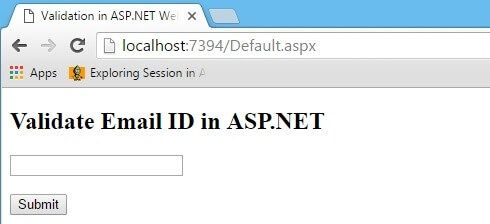Email validation is a crucial aspect of modern software development. Ensuring that you collect and store valid email addresses is vital for communication, user account management, and data quality. In this comprehensive guide, we will explore the world of email validation in .NET, providing you with the knowledge and tools needed to implement robust email validation mechanisms in your applications.
Understanding the Importance of Email Validation
Before diving into the technical details, let's understand why email validation is so crucial:
Data Quality: Valid email addresses enhance the quality of your user data. Accurate user information is essential for effective communication and personalized experiences.
User Experience: Ensuring that users provide valid email addresses during registration or contact forms helps create a smooth and frustration-free experience.
Security: Validating email addresses can help prevent malicious activities like spam and fraud, as well as protect your users from these threats.
Now, let's explore how to validate email addresses effectively in .NET.
Built-in .NET Email Validation
.NET provides a straightforward way to perform basic email validation using regular expressions. Here's a simple example in C#:
using System;
using System.Text.RegularExpressions;
class Program
{
static void Main()
{
string emailAddress = "[email protected]";
if (IsValidEmail(emailAddress))
{
Console.WriteLine("Valid email address.");
}
else
{
Console.WriteLine("Invalid email address.");
}
}
static bool IsValidEmail(string email)
{
string pattern = @"^(?!\.)(""([^""\r\\]|\\[""\r\\])*""|"
+ @"([-a-z0-9!#$%&'*+/=?^_`{|}~]|(?<!\.)[a-z0-9]"
+ @"+(?!\.))+|(?<!\.)\.(?!.)|""[^\r\\]*"")@ "
+ @"(([-a-z0-9]+.)+[a-z]{2,})$";
return Regex.IsMatch(email, pattern, RegexOptions.IgnoreCase);
}
}
This basic example checks if an email address is in a valid format. However, it's essential to note that this approach doesn't verify the existence of the email address or whether it can receive emails.
Using Third-Party Libraries
While basic .NET validation is useful, third-party libraries can enhance your email validation capabilities. Here are some popular libraries and tools:
ZeroBounce: ZeroBounce offers an email validation API and SDK for .NET, allowing you to verify email addresses in real-time, check for deliverability, and prevent invalid entries.
Mailtrap: Mailtrap provides a comprehensive guide on email validation in .NET, along with practical code examples and tips.
Abstract API: Abstract API offers guides and APIs for email validation in C#. You can verify email addresses, check if they are disposable, and ensure they are deliverable.
Best Practices for Email Validation
To master email validation in .NET, follow these best practices:
Use Regular Expressions Sparingly: While regular expressions are handy for basic format validation, they can't verify the existence of an email address. Consider using third-party APIs for more robust validation.
Leverage Third-Party Services: Third-party email validation services like ZeroBounce can provide real-time verification, helping you prevent invalid or disposable email addresses.
Implement User-Friendly Error Handling: When users provide invalid email addresses, ensure that your application provides clear and helpful error messages to guide them.
Consider Verification on Registration: Implement email verification during the registration process to confirm the user's email address's validity.
Regularly Update Validation Rules: Stay up to date with email validation best practices and update your validation rules accordingly.
Frequently Asked Questions (FAQs)
Q1: Can I validate email addresses without using third-party services?
Yes, you can perform basic email format validation using regular expressions, but this won't verify the existence or deliverability of the email address. Third-party services like ZeroBounce offer more comprehensive validation.
Q2: How can I prevent users from entering disposable email addresses?
Third-party services like ZeroBounce can help identify disposable email addresses and prevent users from registering with them.
Q3: Is email validation necessary for all applications?
Email validation is essential for applications that rely on email communication, user registration, or data quality. It enhances user experience and security.
Q4: Are there any free email validation services for .NET?
While some services offer free trials, most comprehensive email validation services



